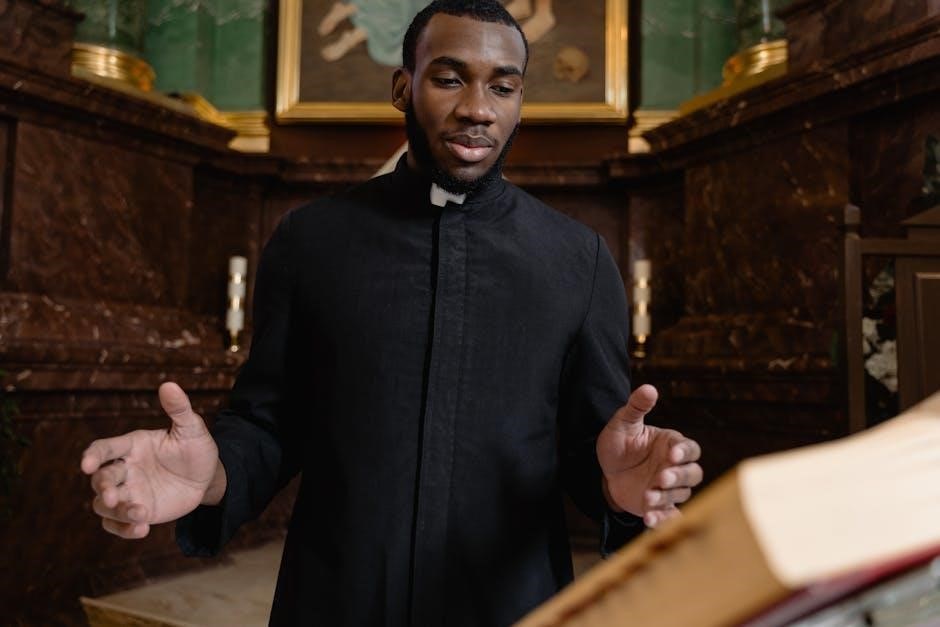The role of a church usher is vital‚ serving as the first point of contact for worshipers. Ushers embody hospitality‚ creating a welcoming atmosphere and ensuring orderly worship services.
Importance of the Usher Ministry
The usher ministry plays a pivotal role in shaping the worship experience‚ ensuring a welcoming and orderly environment. As spiritual ambassadors‚ ushers create a positive first impression‚ reflecting the church’s values of hospitality and compassion. Their presence helps worshipers feel at ease‚ fostering a sense of community and connection. By managing logistical aspects such as seating and offerings‚ ushers enable the congregation to focus on worship without distractions. Their dedication and responsiveness during services contribute to the smooth execution of rituals like Holy Communion. Ultimately‚ the usher ministry is essential for fostering a meaningful and reverent atmosphere‚ supporting the spiritual growth of the congregation.
Overview of Key Responsibilities

Church ushers are tasked with greeting worshipers‚ directing them to seating‚ and ensuring a smooth flow during services. They manage offerings‚ maintain order‚ and assist with special rituals like Holy Communion. Ushers also count attendees and handle logistical aspects‚ such as securing the worship space after services. Their role extends to creating a welcoming environment‚ engaging with the congregation‚ and addressing any special requests. Additionally‚ ushers must remain vigilant and prepared to handle unexpected situations‚ ensuring the service proceeds without disruptions. Their duties require a balance of hospitality‚ organization‚ and spiritual mindfulness‚ making them indispensable to the effective functioning of the church service.

Pre-Service Duties and Preparation
Ushers must arrive early‚ greet worshipers‚ and ensure the worship space is ready. They prepare materials‚ check seating‚ and maintain a welcoming environment before the service begins.
Arrival Time and Readiness
Ushers should arrive at least 35 minutes before the service to ensure adequate preparation. They greet worshipers warmly‚ distribute materials‚ and check the worship space for readiness. Proper attire and a welcoming demeanor are essential. Ushers must review their duties‚ ensure all necessary items are available‚ and be mentally prepared to serve. Early arrival allows them to address any last-minute tasks‚ coordinate with other ministries‚ and ensure a smooth start to the service. This preparation fosters a positive first impression and sets the tone for an orderly and meaningful worship experience for all attendees;
Self-Preparation and Spiritual Mindset
Ushers must prepare spiritually to serve effectively‚ ensuring their actions reflect Christ-like hospitality. Engaging in personal prayer and reflection before duties helps maintain a humble and servant-hearted attitude. They should strive to create a welcoming environment‚ treating everyone with kindness and respect. A spiritual mindset allows ushers to view their role as ministry‚ not just a task. By being attentive‚ approachable‚ and genuinely caring‚ they set the tone for a meaningful worship experience. This spiritual preparation ensures their service honors God and supports the congregation in their worship journey‚ fostering a sense of community and connection within the church family.
Attendance and Faithfulness
Faithfulness is a cornerstone of an usher’s role‚ requiring regular attendance and commitment to their duties. Ushers should consistently attend church services‚ even when not scheduled‚ to support the congregation and ensure smooth operations; Arriving on time for assignments and being prepared to fulfill responsibilities is essential. This includes attending pre-service meetings and staying engaged throughout the worship service. Faithfulness also extends to handling tasks like counting attendees and managing offerings with integrity. By being dependable and present‚ ushers demonstrate their dedication to serving God and their church community‚ fostering a culture of reliability and trust within the ministry.

Greeting and Hospitality
Greeting and hospitality are essential duties of church ushers‚ ensuring worshipers feel welcome. Ushers greet everyone with a handshake‚ smile‚ and warm hello‚ creating a welcoming environment. As spiritual ambassadors‚ ushers set the tone for a positive worship experience‚ reflecting Christ’s love through their actions and demeanor.
Creating a Welcoming Environment
Creating a welcoming environment is a cornerstone of an usher’s responsibilities. By offering a warm smile‚ a firm handshake‚ and a friendly greeting‚ ushers make everyone feel valued and at ease. This includes directing guests to seating‚ ensuring accessibility for all‚ and maintaining a clean and organized worship space. Ushers also manage the flow of people during services‚ allowing family groups to commune together and keeping the center aisle accessible. Their efforts ensure that the atmosphere is conducive to worship‚ reflecting Christ’s love and hospitality. This role is crucial in making visitors feel like part of the church family.
Engaging with Worshipers
Engaging with worshipers is a key aspect of an usher’s role‚ fostering a sense of community and connection. Ushers greet everyone warmly‚ offering assistance and ensuring worshipers feel comfortable. They address needs‚ from locating seats to providing bulletins‚ with a smile and kindness. This interaction helps create a positive first impression and sets the tone for a meaningful worship experience. Ushers also engage by being attentive to special requests‚ such as helping families with young children or assisting those with mobility challenges. Their approachable demeanor encourages worshipers to participate fully‚ ensuring a seamless and inclusive service environment. This engagement reflects the church’s commitment to hospitality and care for all attendees.
Assisting with Seating
Assisting with seating is a core duty of church ushers‚ ensuring worshipers are comfortably and efficiently accommodated. Ushers greet individuals‚ direct them to available seats‚ and ensure families or groups are seated together. They pay special attention to those with mobility challenges or special needs‚ offering assistance as required. Ushers also manage the flow of people to avoid overcrowding or disruptions during services. In cases where seating is limited‚ they may guide worshipers to alternative areas. Their role ensures a smooth and orderly process‚ fostering a distraction-free environment for worship. This thoughtful assistance enhances the overall experience‚ reflecting the church’s commitment to inclusivity and care.

During the Service Responsibilities
During services‚ ushers maintain order‚ ensure a smooth flow‚ and handle practical needs‚ such as managing offerings and assisting with communion‚ ensuring a reverent atmosphere for worship.
Maintaining Order and Flow
Maintaining order and flow during services is a critical responsibility of church ushers. This involves ensuring that the congregation moves smoothly‚ especially during moments like communion or special rituals. Ushers must be attentive to any disruptions and address them discreetly to preserve the worship atmosphere. They also manage the flow of people‚ guiding them to their seats or directing them during processions. By keeping the service orderly‚ ushers help create a focused and reverent environment‚ allowing worshipers to fully engage in the service without distractions. Their role ensures that the service proceeds seamlessly‚ honoring the sacred nature of the gathering.
Counting Attendees
Counting attendees is a key duty of church ushers‚ ensuring an accurate record of worshipers present. This task helps the church leadership understand attendance trends and plan resources effectively. Ushers typically count everyone entering the service‚ including the priest‚ choir‚ and other staff‚ to provide a comprehensive count. This information is crucial for reporting and decision-making. By meticulously performing this duty‚ ushers contribute to the church’s organizational efficiency and help maintain a structured approach to worship services. Their attention to detail ensures that the data collected is reliable and useful for the church’s ministries and planning processes.
Managing Offerings and Collections
Ushers play a pivotal role in managing offerings and collections during worship services. They are responsible for distributing and collecting offering baskets or plates‚ ensuring the process is orderly and respectful. After collection‚ ushers securely transport the offerings to a designated area‚ often the church safe‚ to prevent loss or mishandling. This duty requires trustworthiness and attention to detail. By handling offerings with care‚ ushers contribute to the financial sustainability of the church‚ supporting its ministries and community outreach. Their integrity in this task upholds the church’s stewardship principles and fosters confidence among the congregation in the responsible use of resources.

Holy Communion and Special Services
Ushers play a crucial role in Holy Communion by directing the congregation‚ managing the flow to the altar‚ and handling special requests to ensure orderly participation.
Directing the Congregation
Ushers are responsible for guiding worshipers during Holy Communion‚ ensuring a smooth flow. They direct individuals to the center aisle‚ allowing family groups to commune together seamlessly. By maintaining order‚ ushers help prevent congestion and ensure everyone can participate without disruption. This role requires attention to detail and a gentle‚ yet firm‚ approach to keep the procession moving steadily. Effective direction fosters a reverent and organized atmosphere‚ enhancing the spiritual experience for all attendees. Ushers also assist in managing any special requests‚ ensuring that the service remains dignified and focused on worship.
Assisting with Holy Communion Distribution
During Holy Communion‚ ushers play a crucial role in facilitating the distribution of elements. They ensure an orderly flow of worshipers to the altar‚ guiding them to the appropriate stations. Ushers may also assist in distributing communion elements‚ such as bread or wine‚ to the congregation. Additionally‚ they help maintain a reverent atmosphere by managing the movement of people and addressing any logistical needs. Their support allows the clergy and other ministers to focus on the sacramental aspects of the service. This responsibility requires both spiritual mindfulness and practical coordination to ensure a smooth and meaningful experience for all participants.
Handling Special Requests
Ushers often manage special requests during services‚ ensuring all needs are met with care and discretion. This may include accommodating individuals with disabilities‚ handling special seating arrangements‚ or addressing unique logistical challenges. Ushers must remain attentive and flexible‚ ready to adapt to unforeseen situations while maintaining order. They may also assist with coordinating special ceremonies or events within the service‚ such as baptisms or dedications. Effective communication and teamwork with other ministries are essential to fulfill these responsibilities seamlessly. By addressing special requests with compassion and efficiency‚ ushers enhance the worship experience‚ ensuring everyone feels included and supported.

Post-Service Duties
After the service‚ ushers ensure a smooth dismissal‚ securing the worship space‚ and handling any remaining tasks. They also follow up with attendees as needed.
Ensuring a Smooth Dismissal
Ushers play a crucial role in ensuring a smooth dismissal after the service. They assist in guiding the congregation out of the worship space in an orderly manner‚ helping to maintain a peaceful and respectful atmosphere. This involves directing individuals to exits‚ managing any congestion‚ and ensuring that everyone departs safely. Additionally‚ ushers are attentive to any special needs‚ such as assisting elderly members or families with young children. By facilitating a well-organized dismissal‚ ushers contribute to a positive overall worship experience and prepare the space for any subsequent activities or services.
Securing the Worship Space
After the service‚ ushers ensure the worship space is secured. This includes checking pews for left items‚ verifying all doors are locked‚ and ensuring the sanctuary is tidy. They also assist in safeguarding offerings‚ ensuring they are properly stored or deposited. Ushers review the area to prevent damage or theft‚ upholding the church’s security and integrity. Their diligence helps maintain a safe and respectful environment‚ reflecting their commitment to serving the congregation and preserving the sacred space.
Follow-Up and Communication
Effective communication is key to an usher’s role. After services‚ ushers follow up with attendees to address any needs or concerns; They also communicate with church leadership regarding service proceedings‚ noting any issues or feedback. This ensures continuous improvement and addresses potential areas needing attention. Ushers may also connect with visitors‚ providing additional information or support. Their role extends beyond the service‚ fostering community and ensuring a positive experience for all worshipers through thoughtful engagement and clear communication.

Special Events and Additional Responsibilities
Ushers often handle large or unique services‚ ensuring smooth operations. They coordinate with other ministries and adapt to seasonal adjustments‚ maintaining order and hospitality during special events.
Handling Large or Unique Services
Ushers play a crucial role in managing large or unique services‚ ensuring efficient crowd control and seating arrangements. They must remain vigilant‚ addressing any disruptions promptly to maintain order. Special events often require additional coordination with other ministries‚ and ushers must adapt their strategies to accommodate unusual layouts or procedures. Effective communication is key to guiding worshipers seamlessly‚ especially during processions or special ceremonies. Ushers must also be prepared to handle unexpected situations with tact and patience‚ ensuring that the service remains dignified and reverent. Their ability to think on their feet is essential in such dynamic environments.
Coordinating with Other Ministries
Coordinating with other ministries is essential for ushers to ensure a unified and efficient worship experience. They collaborate with greeters‚ choir members‚ and other church staff to streamline operations. By maintaining open communication‚ ushers can address specific needs‚ such as special seating arrangements or assisting with offerings. This teamwork fosters a cohesive environment‚ allowing the congregation to focus on worship without distractions. Ushers must also be flexible‚ adapting their roles to support various ministries during joint events or special services. Their coordination efforts are vital in upholding the church’s mission of hospitality and spiritual growth.
Summer Worship and Seasonal Adjustments
During summer worship‚ ushers adapt to changes such as combined services or adjusted schedules. They ensure smooth crowd management and seating arrangements‚ particularly for larger or unique gatherings. Ushers must remain flexible to accommodate seasonal fluctuations in attendance while maintaining order and hospitality. Their role is crucial in creating a seamless worship experience‚ even during less formal summer services.
Seasonal adjustments also require ushers to coordinate with other ministries for special events like holiday services or outdoor worship. They may assist with parking‚ direct visitors‚ or manage overflow areas. Ushers play a vital role in maintaining a welcoming environment throughout the year‚ ensuring every service reflects the church’s commitment to hospitality and spiritual growth.

Personal Qualities and Spiritual Growth
A church usher must embody spiritual maturity‚ tact‚ and selflessness‚ serving as a faithful ambassador of Christ. Their commitment to spiritual growth and humble service reflects God’s love.
Being a Spiritual Ambassador
Church ushers serve as spiritual ambassadors‚ representing Christ and the church community. Their role extends beyond logistics‚ as they create a welcoming environment that reflects God’s love. Ushers must maintain a spiritual mindset‚ ensuring their actions and demeanor honor Christ. They are often the first point of contact for visitors‚ shaping initial impressions of the church. By demonstrating compassion‚ kindness‚ and humility‚ ushers embody the teachings of Jesus‚ fostering a sense of belonging among worshipers. Their faithfulness in service is a testament to their commitment to spiritual growth and the advancement of God’s kingdom.
Practicing Tact and Selflessness
Church ushers must practice tact and selflessness to ensure a harmonious worship experience. Tact is essential when addressing challenging situations‚ such as disruptive behavior or seating conflicts‚ ensuring dignity and respect for all. Selflessness is demonstrated by prioritizing others’ needs‚ like assisting the elderly or comforting the distressed. Ushers should avoid drawing attention to themselves‚ focusing instead on creating a welcoming environment. Their actions reflect Christ-like humility and compassion‚ fostering unity within the congregation. By balancing firmness with kindness‚ ushers maintain order while embodying the heart of servant leadership‚ making worshipers feel valued and supported.
Commitment to Giving and Attendance
A church usher’s effectiveness is deeply rooted in their commitment to giving and attendance. Faithful attendance at church services‚ even when not scheduled to usher‚ demonstrates dedication to the community. Regular participation in worship and church activities fosters a strong spiritual foundation‚ enabling ushers to serve with authenticity and enthusiasm. Additionally‚ ushers are encouraged to contribute financially to the church‚ supporting its mission and ministries. This commitment reflects their role as spiritual ambassadors and sets an example for others. By prioritizing giving and attendance‚ ushers embody the principles of stewardship and servant leadership‚ strengthening the church and inspiring fellow believers.

Training and Development
Effective ushers undergo training to understand church policies‚ protocols‚ and best practices. Mentorship from experienced ushers and workshops ensure they are well-prepared to serve with confidence and excellence.
Understanding Church Policies
Ushers must familiarize themselves with the church’s specific guidelines‚ such as seating arrangements‚ emergency procedures‚ and communication protocols. Adhering to these policies ensures a smooth and respectful service environment. Knowledge of offerings‚ collections‚ and communion procedures is essential. Understanding the church’s mission and values helps ushers align their service with the congregation’s needs. Regular updates on policy changes are crucial for maintaining consistency and effectiveness in their roles. By understanding and adhering to these policies‚ ushers contribute to a well-organized and Spirit-filled worship experience for all attendees.
Learning from Experienced Ushers
Novice ushers benefit greatly from guidance provided by experienced ushers. These seasoned individuals often serve as mentors‚ sharing practical insights and best practices. They can offer tips on effectively managing the flow of worshipers‚ handling challenging situations with tact‚ and maintaining a spiritual mindset during services. Experienced ushers also provide valuable feedback‚ helping new ushers refine their skills and build confidence. Their real-world experience is invaluable‚ ensuring that the ushering ministry remains effective and compassionate. By learning from these mentors‚ new ushers can grow into capable and dedicated servants‚ enhancing the overall worship experience for the congregation.
Staying Updated on Best Practices
Staying updated on best practices ensures ushers remain effective in their roles. Regularly reviewing church guidelines‚ attending workshops‚ and participating in training sessions helps ushers adapt to new procedures. Communicating with church leaders and fellow ushers fosters a collaborative environment for sharing insights. Incorporating feedback from worshipers and addressing emerging needs ensures the ministry evolves. Ushers should also familiarize themselves with new technologies or tools used in services. Continuous learning and adaptation enable ushers to provide seamless support‚ enhancing the overall worship experience. By staying informed‚ ushers can address challenges efficiently and maintain a spirit of excellence in their service.
The church usher plays a vital role in creating a welcoming and orderly environment‚ ensuring worshipers feel valued. Their dedication and faithfulness are essential to fostering a positive first impression and supporting the church’s mission effectively.
The Impact of an Usher’s Ministry
The usher’s ministry profoundly impacts the church community and visitors. As spiritual ambassadors‚ ushers create lasting first impressions through hospitality and service. Their role ensures orderly worship services‚ fostering a focused and meaningful experience for all. By maintaining order and addressing needs‚ ushers contribute to the spiritual atmosphere‚ helping worshipers connect with God and the congregation. Their faithfulness and selflessness inspire others‚ showcasing the church’s values. Effective ushering not only enhances worship but also supports the church’s growth‚ making it a vital and influential ministry within the body of believers. Their service is a testament to their commitment to God and His people.
Final Thoughts on Serving Effectively
Serving as an usher requires a blend of spiritual dedication and practical skill. To be effective‚ ushers must remain attentive‚ compassionate‚ and organized. Consistency in fulfilling duties ensures a seamless worship experience. By fostering a welcoming environment‚ ushers reflect Christ’s love and the church’s values. Training‚ teamwork‚ and a commitment to excellence are essential for success. Praying for wisdom and humility strengthens an usher’s ability to serve others. Ultimately‚ the role is not just about tasks but about creating a space where people can encounter God; Effective ushering is a powerful way to honor God and bless His people.
